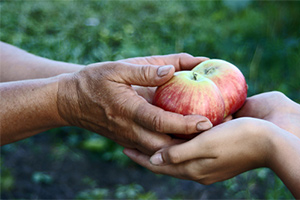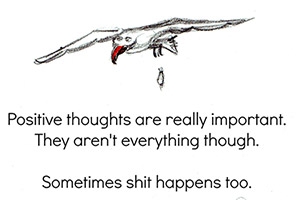5 Life-Improving Benefits of Being (Truly) Generous
Generosity is good for you, but what does it really mean to be generous?
 Generosity can help the giver as much as the receiver
Generosity can help the giver as much as the receiver"You know what love is? It is all kindness, generosity."
- Rumi
They say that false or fool's gold can only exist because there is real gold in the world.
Being generous is good for you.1 But here's a thought. What does it really mean to be generous?
Should you really take anything that's offered to you?
In an episode of the hit TV sitcom Seinfeld, a rather obnoxious character offers his Armani suit and then insists a reluctant Jerry Seinfeld take it, as it no longer fits him.
Jerry senses there's going to be trouble. As the man hands over the suit he adds cryptically, "And I don't even want anything for it... okay, I'll let you buy me dinner!"
Jerry reluctantly takes him out to an expensive restaurant in return for having his suit, but the man only has soup and a sandwich. He then tells Jerry that he has not had a "proper dinner", as soup isn't dinner. He now expects to be taken out again and again, because, each time, he hasn't had a "proper dinner". Jerry ends up passing on the cursed suit to someone else.
It's clear that this man had not really done Jerry any favour at all. What he really did was force a transaction on Jerry - "I'll give you this if you give me that!" This is no more generous than any other transaction.
So what is real generosity?
Recognizing real gold
I love generous people, as I'm sure you do. And generosity can come in different forms. Giving someone attention can be an extremely generous act.
A generous person doesn't always hog the limelight, but listens and shows interest in others. They let other people speak - that is a genuine form of generosity. Greed for attention is a form of meanness.
The generous-hearted will make light of their own generosity and not be unduly impressed, sentimental, or arrogant about their own acts of giving.
They are more likely to feel that it is 'really nothing' or just 'natural'. You are unlikely to find self-importance, self-congratulation and true generosity combined in the same person.
To be really generous we may need to transcend an ancient commercial mindset that many of us have had ingrained.
Take care with that commercially ingrained mindset
"Real generosity is anonymous to the extent that a man should be prepared even to be considered ungenerous rather than explain it to others."
- Idries Shah, from Learning How to Learn: Psychology and Spirituality in the Sufi Way
We are so trained to think in transactional terms: "I give you this, you give me that." This comes from having lived in a mercantile culture for so long. But generosity is about transcending this transaction mindset.
So rather than "You get something from me and I get your gratitude/admiration/a warm fuzzy feeling of being a good person!" simply: "I do something for you and... that's the end of it."
Certainly society works along the lines of reciprocity: 'You scratch my back and I'll scratch yours." But I'm talking about another kind of quality here, one that can bring all kinds of benefits to the world.
A truly generous person will remember kindnesses done to them, but forget those they have done for other people. And, ultimately, really generous people may expect nothing in return for their decency - perhaps not even the feeling of satisfaction at having done good.
This might be a hard idea to get your head around. Maybe you wonder what difference attitude makes as long as good is being done.
But I feel that generosity tracks alongside that other great virtue, courage. It can take courage to give when you feel poor, or weak, or perhaps unrecognized as even being generous. But in those circumstances the generosity is even greater. It may be all the more real for not being Instagrammed.
And expecting to be "paid back" for acts of decency can cause all kinds of unforeseen problems.
Understanding the dark side of 'generosity'
People who are merely putting on a generous front never forget what they have done for you and always expect something in return (like Seinfeld's Armani suit 'benefactor').
In 2003, psychologist Francis Flynn did some research on favours. He discovered that right after a favour has been done, the receiver of the favour assigns it a greater value than the giver - but as time goes on, this reverses.2 The recipient of the favour devalues the favour while the favour-giver sees it as more important as time passes - especially, presumably, if no favour has been returned.
This clearly has more to do with the psychology of commercial transaction than disinterested generosity. We like to see ourselves in the best possible light, so if you have received a favour you may be grateful at first, but six months later it may suit you to feel you didn't really need that much help at the time after all. Ingratitude is a form of meanness.
Maybe, just sometimes, we need to stop bailing people out all the time. We really may need to be cruel to be kind, to force them to take responsibility and stop being dependent.
Seemingly not helping a person in the way they expect may be, paradoxically, a form of generosity. When we refuse to lend yet more money, for example, even though it makes us feel bad, we are negating our need to feel good in order to perhaps truly help a person. (As long as we don't then use that as an excuse never to help.)
The genuinely generous won't have to receive emotional 'payment' for their acts of giving in the form of a buzz or feeling like a 'good person'. Nor will they have to be seen as generous by others and therefore 'paid' in feelings of superiority.
The danger is that it's too easy to feel generous or even have a generous reputation while really operating through disguised commercial transactions.
When doing favours isn't generous
Human relationships need balance. Once we understand the hidden rules that govern human behaviour, life becomes easier to manage.
One of these hidden rules is that of obligation of reciprocation. Advertisers know about the power of obligation, as they demonstrate through their 'free' gifts and the 'complimentary' cup of coffee you sip as you peruse the expensive car.
If someone gives us something, or does something for us, we feel beholden. Compliments can have a similar effect; they make us feel as if someone has done something for us, and because of this we may unconsciously (or consciously) feel more motivated to do something back for that person.
This societal human norm can get bound up with the idea of generosity: "I will do something for you or say something nice to you and collect my 'payment' later!"
But the unconscious assumption that generosity is really transactional can cause big problems.
Are you being emotionally blackmailed?
You know you are being emotionally blackmailed when people constantly remind you what they have done for you: "After all I've done for you, you can't even do this one tiny thing for me!"
So if 'generosity' is too wrapped up with ego, wanting to feel morally superior or virtuous, rather than a natural extension of who we are, it may backfire and make us worse in some ways.
It might cause resentment and emotional blackmail down the line. But when we are not looking for too much in return, real generosity does seem to confer benefits - especially, perhaps, when those benefits are not the main reason we are helping.
So, what are the benefits of generosity for the generous one?
How giving time, help, money or love may help you
Just as the regular practice and feeling of gratitude helps us to live better, so too does being generous. Here are five evidence-based byproducts of practicing generosity.
Have a heart and be generous.
One study found that spending money on others can significantly lower blood pressure.3 The authors write:
This work provides the first longitudinal and experimental evidence that financial generosity can improve cardiovascular health. The impacts were clinically relevant - the effects of prosocial spending on systolic and diastolic blood pressure were similar in magnitude to the changes documented in response to well documented interventions such as high frequency exercise or diet modification.
That is quite amazing. The world needs generous-hearted people, and people's hearts need generosity. Linked to this is the effect of generous behaviour on stress levels.
Stress less by helping more
Another study has found that being generous helps us manage stress.4 During the study subjects were connected to heart monitors while participating in "transactions". The researchers found that when people felt they were giving too little in a transaction their stress levels rose significantly. When they were kinder, on the other hand, stress decreased. Lowering stress and helping your heart may also be linked to the next finding.
Be kind and happier
It's often said that we should have the occasional "me time" - time to pamper ourselves. Certainly, healthy pleasures can help us in all kinds of ways.5 But helping others - giving money, time, attention or practical help - can make us happier as some other research shows.
It seems that doing good is neurobiologically tied to feeling good. In a study of 2000 people, those who described themselves as "very happy" volunteered to help others for an average of 5.8 hours per month.6 Compare that to just 0.6 hours a month for those who described themselves as unhappy. Focusing on the welfare of others helps our happiness. And, not surprisingly, it also helps our relationships.
Generous people have better relationships
Being generous in marriage increases the relationship satisfaction of not just the receiver but also the giver of the generosity.7
The researchers write: "The extension of generosity toward the spouse was positively related to their own reports of marital satisfaction..."
Lastly, if we want to last, it seems generosity may help us do that too.
Being generous may help us live longer
A study in Marin in California found that subjects who spent time volunteering had dramatically reduced mortality rates. In other words, they lived longer!
The mortality rate of participants who volunteered for two or more causes during the study period was 63 percent lower than that of people who didn't volunteer.
Being generous helps us connects to the community, derive a sense of meaning, and become less self-absorbed and more outward-focused. Being generous to others can also help build a sense of intimacy with people; others feel they want to give to us as we gave to them - this is, in part, how relationships form.
So let's just sum up.
We should do things for one another. Selfishness is good for no one. But we should also be mindful that favours can be used as weapons when the favours grow not from a truly generous heart but merely from self-interest.
The more true, selfless generosity we see in the world, the more optimistic the future of the human race becomes. First, we must believe that true and completely unselfish generosity is possible, and second, we must stop worshipping generosity as something sublime rather than just a natural part of being human.
If generosity can't truly exist, if we are all essentially selfish, then favours must always be viewed with suspicion. Myself, I'm more suspicious of that pessimistic idea.
You will find people in life who will simply help and give without using it to inflate their ego or hold you to account.
Such people are gold.
References
- Renter, E. (2015). What generosity does to your brain and life expectancy.U.S. News & World Report.
- Flynn, F. J. (2003). What have you done for me lately? Temporal adjustments to favour evaluations. Organizational Behavior and Human Decision Processes, 91, 38-50.
- Whillans, A. V., Dunn, E. W., Sandstrom, S. S., Dickerson, S. S., & Madden, K. M. (2016). Is spending money on others good for your heart? Health Psychology, 35(6), 574-583.
- Dulleck, U., Schaffner, M., Torgler, B. (2014). Heartbeat and economic decisions: Observing mental stress among proposers and responders in the ultimatum bargaining game. PLoS ONE, 9 (9): e108218
- Ornstein, R. E., & Sobel, D. (1990). Healthy Pleasures. Da Capo Press, Massachusetts.
- Smith, J. M. (2014, September 21). Want to be happy? Stop being so cheap! New Republic.
- Dew, J., & Wilcox, W. B. (2013). Generosity and the maintenance of marital quality. Journal of Marriage and Family, 75, 1218-1228






